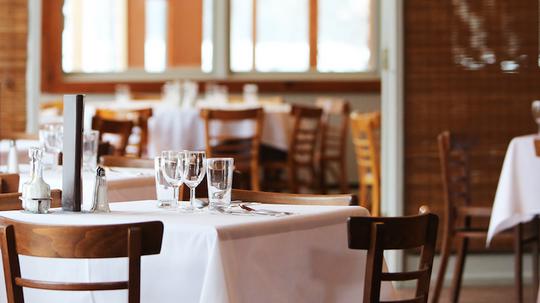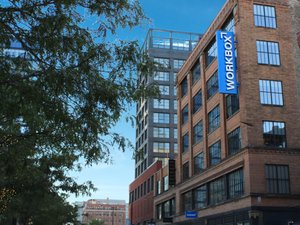
Food delivery has boomed in the age of tech and startups.
New startups that claim to get food from restaurant to a consumer's couch in under an hour seem to pop up every few months, while a giant in the space, Chicago's GrubHub, just saw a 78% increase in quarterly profit as their number of active diners bumped up 26%.
But while people are more likely than ever to order in, the fine dining space has also seen a surge in interest. Top chefs achieve celebrity status with shows like Netflix's "Chef's Table" and meticulously crafted dining experiences (think Alinea's edible balloons) have diners booking reservations months in advance. The James Beard Awards, which take place Monday at Chicago's Lyric Opera, are no longer a niche industry awards ceremony, but an indicator of the next hottest restaurants in cities around the country.
Given these two dining options are surging side by side, top-tier restauranteurs and chefs are starting to offer menus with travel time in mind, and even open delivery-only eateries that serve quality food that a diner can eat on their couch. At the same time, they're embracing tech, such as ticketing app Tock, that makes it easier to get diners in the door to have food experiences that just can't be replicated in a to-go box.
Boka's food doesn't translate to a delivery box
The first sign that the fine dining establishment was taking notice of the surge in delivery apps was the opening of Ando Restaurant, a virtual, delivery-only eatery by famed Momofuku chef David Chang. A similar virtual restaurant concept from New York City startup Green Summit Group, opened in Chicago in March.
Kevin Boehm, cofounder of Chicago's Boka Restaurant Group (which is behind Girl & the Goat, Swift & Sons and Michelin-starred Boka, among others) said he's looked at these options, but ultimately doesn't anticipate going down the delivery-first road.
"It's so busy at Momotaro, we would have to sacrifice quality to do delivery, which we just won't do," Boehm said. "Boka's food doesn't translate to a delivery box, because we'd have to separately box the sauce [and] plating is such a big part. It just doesn't translate."
That said, he hasn't entirely eschewed the delivery trend. They offer a limited GrubHub delivery menu of pasta, salads and pizzas (cooked in a deck line oven, rather than their brick oven because it will travel better) from Lincoln Park Italian restaurant Balena, and a takeout window and DoorDash delivery at Chinese food eatery Duck Duck Goat. But Boehm doesn't see these offerings cutting into the dining room experience.
"I think that people are getting delivery food instead of cooking," he said. "I don't think they're making the choice of, do I want to go out and have a social experience or sit at home and have delivery food?"
For Adam Siegel, the James Beard award-winning corporate chef and managing partner at Milwaukee-based restaurant group The Bartolotta Restaurants, delivery offers a way to increase reach at his fast casual restaurants. Within the last year he started experimenting with delivery services, such as GrubHub and UberEats, at his Tacqueria El Jefe and barbecue joint Miss Beverly's Deluxe Barbecue. It's worked particularly well for busy lunch and dinner hours, where office groups will order takeout, allowing them to expand the sales of their suburban fast casual spots which have smaller dining rooms.
However, he's also hesitant to introduce delivery apps to his top tier restaurants. In addition to concerns about food quality and travel time, Siegal said he's not sure he wants food from a takeout box to be a customer's first impression of his restaurants.
"I would never say no to these services, but I think the business owner or the business that is using them has to be wise as to how they’re using them," he said.
However given Boehm and Siegal are at the helm of restaurant groups with several tiers of dining experiences, they have the flexibility to pick and choose the restaurants and dishes better fit for delivery. Ryan McCaskey, chef and owner at Michelin-starred South Loop restaurant Acadia, doesn't anticipate ever using a delivery app.
I would never say no to these services
"At this point, I don't see this trend changing for the fine dining category because it is too complicated to offer catering," he said over email. "The integrity of the dish often won't sustain by the time it's packaged and delivered."
However, that isn't to say that top-tier restaurants are entirely tech adverse. He noted that reservation tech, such as Chicago-based ticketing app Tock, which allows diners to book and prepay for dining "experiences" (and increases the likelihood that diners will show up for their meal, even in inclement weather), can help ensure that business is steady.
"I think fine dining may be impacted the most at the reservation taking systems," McCaskey said. "Sites like Tock, which we use, are probably going to be the future. People will look for more streamlined systems that are easy to use and make sense."
Note: Story updated to clarify Adam Siegel's title.








